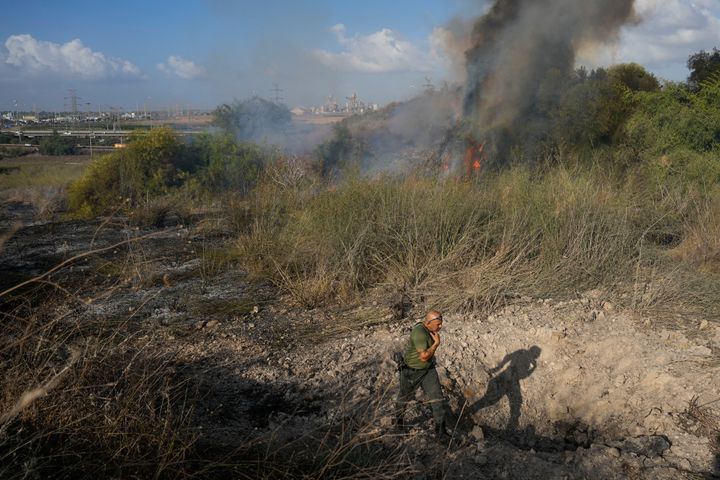A Missile Fired By Yemen’s Rebels Lands In Israel And Triggers Sirens At International Airport
A missile fired by Yemen’s Iran-backed rebels has landed in an open area in central Israel.


JERUSALEM (AP) — A missile fired by Yemen’s Iran-backed rebels landed in an open area in central Israel early Sunday and triggered air raid sirens at its international airport, in the latest reverberation from the nearly yearlong war in Gaza. Israel hinted that it would respond militarily.
There were no reports of casualties or major damage, but Israeli media aired footage showing people racing to shelters in Ben Gurion International Airport. The airport authority said that it resumed normal operations shortly thereafter.
A fire could be seen in a rural area of central Israel, and local media showed images of what appeared to be a fragment from an interceptor that landed on an escalator in a train station in the central town of Modiin.
Israel’s army said the surface-to-surface missile was intercepted by Israel’s defense system, which hit and fragmented the target but did not destroy it. It said the missile appeared to have fragmented midair. The military said the sound of explosions in the area came from interceptors.
The Yemeni rebels, known as Houthis, have repeatedly fired drones and missiles toward Israel since the start of the war in Gaza between Israel and the Palestinian militant group Hamas, but nearly all of them have been intercepted over the Red Sea.
In July, an Iranian-made drone launched by the Houthis struck Tel Aviv, killing one person and wounding 10 others. Israel responded with a wave of airstrikes on Houthi-held areas of Yemen, including the port city of Hodeidah, a Houthi stronghold.
Israel indicates it will respond to attack
Israeli Prime Minister Benjamin Netanyahu hinted at a similar response in remarks at a Cabinet meeting after Sunday’s attack.
“The Houthis should have known by now that we exact a heavy price for any attempt to harm us,” he said. “Anyone who needs a reminder is invited to visit the port of Hodeidah.”
Brig. Gen. Yahya Saree, a military spokesman for the rebels, said they fired a ballistic missile targeting “a military target” in the area of Tel Aviv.
The Houthis have also repeatedly attacked commercial shipping in the Red Sea, in what the rebels portray as a blockade on Israel in support of the Palestinians. Most of the targeted ships have no connection to Israel.
On Sunday, a European Union naval mission operating in the Red Sea said salvagers had begun towing a tanker that had been on fire for weeks after a Houthi attack. Operations Aspides said the Greek-flagged Sounion was being taken to a “safe location.”
The war in Gaza, which began with Hamas’ Oct. 7 attack into southern Israel, has rippled across the region, with Iran and allied militant groups attacking Israeli and U.S. targets and drawing retaliatory strikes from Israel and its Western allies. On several occasions, the strikes and counterstrikes have threatened to trigger a wider conflict.
International carriers have canceled flights into and out of Israel on a number of occasions since the start of the war, adding to the conflict’s economic toll on the country.
Iran supports militant groups across the region, including Hamas, the Houthis and Lebanon’s Hezbollah, its most powerful ally, which has traded fire with Israel on a near-daily basis since the war in Gaza began. Iran and its allies say they are acting in solidarity with the Palestinians.
Israel says ‘high probability’ its strike killed three hostages in Gaza
On Sunday, the Israeli military said there was a “high probability” that three hostages found dead months ago were killed in an Israeli airstrike.
The army announced the conclusions of its investigation into the deaths of Cpl. Nik Beizer, Sgt. Ron Sherman and Elia Toledano. It said investigations had determined that the three were likely killed in a November airstrike that also killed a senior Hamas militant, Ahmed Ghandour.
All three of the hostages were kidnapped in Hamas’ Oct. 7 attack. Their bodies were recovered in December, but the cause of death was only recently determined.
In its report, the army said there was a “high probability” they were killed in the strike, based on where the bodies were recovered, pathological reports and other intelligence. But it said, “it is not possible to definitely determine the circumstances of their deaths.”
The conclusions could add pressure on the government to strike a deal to bring home the remaining hostages held by Hamas. Critics say it’s too difficult and dangerous to try to rescue them. Late last month, Israel recovered the bodies of six hostages that it says were killed by Hamas captors shortly before Israeli forces arrived.
The army’s announcement is the first time it has linked the deaths of hostages to airstrikes. In other cases of bodies being recovered, the army has said people were either killed on Oct. 7, died in Hamas captivity or were killed by the militant group.
In December, the army acknowledged mistakenly killing three hostages who had escaped Hamas captivity in a battle-torn neighborhood of Gaza City. It was believed that the three had either fled their captors or been abandoned.
Around 250 hostages were taken on Oct. 7. Israel now believes 101 remain in captivity, including 35 who are thought to be dead. More than 100 were freed during a cease-fire in November in exchange for the release of Palestinians imprisoned by Israel. Eight have been rescued by Israeli forces.
Rockets fired from Lebanon
The military said that around 40 projectiles were fired from Lebanon early Sunday, with most intercepted or falling in open areas.
In a separate incident, Israeli forces dropped leaflets over the Lebanese border town of al-Wazzani, calling on residents to evacuate. The military later said there were no such evacuation orders, and that a local commander had acted without the approval of his superiors. It said the incident was under investigation.
It wasn’t immediately clear if anyone had evacuated the town, or if any message had been conveyed to residents that the leaflets were dropped in error.
The strikes along the Israel-Lebanon border have displaced tens of thousands of people on both sides. Israel has repeatedly threatened to launch a wider military operation against Hezbollah to ensure its citizens can return to their homes.
“The status quo will not continue,” Netanyahu said at the Cabinet meeting. “This requires a change in the balance of power on our northern border. We will do everything necessary to return our residents safely to their homes.”
Gaza smuggling tunnels blocked
Hezbollah has said it would halt its attacks if there is a cease-fire in Gaza. The United States and Arab mediators Egypt and Qatar have spent much of this year trying to broker a truce and the release of scores of hostages held by Hamas, but the talks have repeatedly bogged down.
In recent weeks, Netanyahu has insisted on lasting Israeli control over the Gaza side of the border with Egypt, which Israeli forces captured in May. He has said Hamas used a network of tunnels beneath the border to import arms, allegations denied by Egypt, which along with Hamas is opposed to any lasting Israeli presence there.
An Israeli military official said late Saturday that of the dozens of tunnels discovered along the border, only nine entered Egypt, and all were found to have been sealed off. The official, who spoke on condition of anonymity to discuss sensitive intelligence, said that it wasn’t clear when the tunnels were sealed.
The discovery appeared to weaken Netanyahu’s argument that Israel needs to keep open-ended control of the corridor to prevent cross-border smuggling.
Egypt has said it sealed off the tunnels on its side of the border years ago, in part by creating its own military buffer zone along the frontier.
___
Natalie Melzer reported from Nahariya, Israel. Associated Press writers Samy Magdy in Cairo, Jon Gambrell in Dubai, United Arab Emirates, and Josef Federman and Isaac Scharf in Jerusalem, contributed to this report.
___
Find more of AP’s coverage at https://apnews.com/hub/israel-hamas-war
Support Free Journalism
Already contributed? Log in to hide these messages.








